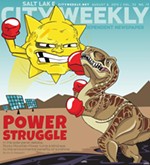Ang Lee Revives an Idealistic View of a Legendary Event in 'Taking Woodstock'

Ken Regan/Focus Features
It has been more than 30 years since Ang Lee made his way to America from Taiwan to continue his film studies. And as is often the case, you can learn a lot about a place when you look at it through the eyes of someone who isn't from there.
Though Lee began his filmmaking career by telling stories about people who, like him, were Taiwanese or Taiwanese-American, he gradually migrated to distinctly American tales. More specifically, his films began to address American ideas that had come to be mythologized: the swinging '70s (The Ice Storm); the Civil War (Ride With the Devil); the taciturn West (Brokeback Mountain). Even his much-criticized version of the comic-book character Hulk was a take on an American myth.
Taking Woodstock, in that context, falls squarely within Lee's sweet spot. This may not be a look at the Woodstock that was, but it's fairly charming as a look at the Woodstock that we sort of wish it had been.
Lee and his frequent screenwriting collaborator James Schamus adapt the memoir by Elliot Tiber (nee Teichberg) and Tom Monte, following young Elliot (comedian Demetri Martin) through the summer of 1969. A struggling interior designer, he spends much of his time trying to keep afloat the crumbling Catskills motel run by his mother (Imelda Staunton) and father (Henry Goodman). Foreclosure may be imminent, but Elliot uses his role as president of the local chamber of commerce to lure a proposed festival kicked out by neighboring towns. After all, it's just going to be three days of peace, love and music. What could go wrong?
The film's first half takes a mostly farcical course, and offers plenty of charms. Lee and Schamus effectively establish White Lake, New York's pokey rhythms, including a goofy chamber of commerce meeting focused on odd minutiae. Staunton gets a great early scene accusing the local bank manager of anti-Semitism for refusing to extend their loan, and Eugene Levy has his own hilarious moments as pragmatic dairy farmer Max Yasgur, most notably when he plays hardball with Woodstock organizers about the cost of renting his farm while serving up cartons of chocolate milk. As a purely comedic take on culture clash, Taking Woodstock is thoroughly satisfying.
Eventually, of course, it proves to have other thematic fish to fry. As preparations for the festival pick up steam, we learn a little bit more about Elliot, who seems to have sacrificed more than his cash and his career for his parents' sake -- including his own sexual identity. Elliot's growing need to live his own open life comes into focus through his experience at Woodstock -- which makes it hard not to wish that a more dynamic, experienced actor were taking on the role. Martin has a shaggy appeal when dealing with the film's lighter material, but he's also asked to pull off some serious expressions of internal conflict, and he's not quite up to the task.
It's fortunate, then, that most of Taking Woodstock allows Elliot to be a kind of open surrogate for the audience's experience of those three muddy, insane days. Lee captures the scope of the event by turning the actual performing stage into little more than a rumor for most of the attendees, and following Elliot through the staggering human parade making its way to the festival grounds. While the narrative touches on the logistical nightmares -- disposing of human waste for half a million people; avoiding electrocution during the downpours -- mostly it's a chance to marvel at how much went right in this impromptu utopian community.
Lee may go a bit over the top in romanticizing Woodstock -- his visual interpretation of an LSD trip basically turns the world into a Van Gogh painting -- but he also recognizes how short-lived this dream vision was. He ends the film not just on a shot of people still gathering the garbage from the farm, but with an oblique reference to the upcoming -- and ultimately tragedy-marred -- music festival at Altamont. The blissed-out Woodstock vision may not have lasted very long, but Taking Woodstock suggests that at least for a few days, it was real. And even if that point of view is a myth, it's a tremendously appealing one.
TAKING WOODSTOCK
*** (three out of four stars)
Starring Demetri Martin, Imelda Staunton, Liev Schreiber.
Directed by Ang Lee.
Rated R.




